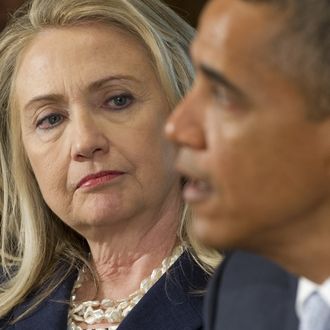
Earlier on her book tour and/or not-so-secret campaign practice run, Hillary Clinton gingerly criticized the current administration, saying, “We have not been telling our story very well.” (Echoing Obama, who cited the same thing as a major failure of his first term.) In an interview with The Atlantic’s Jeffrey Goldberg released on Sunday, Clinton gave a considerably sharper critique of Obama’s leadership, using the word “failure” twice to describe the president’s decision to stay out of the conflict in Syria, and bashing the White House’s self-proclaimed foreign policy doctrine “don’t do stupid stuff” (or rather “shit,” though Clinton stuck with the cleaned-up version). “Great nations need organizing principles, and ‘Don’t do stupid stuff’ is not an organizing principle,” she said. “It may be a necessary brake on the actions you might take in order to promote a vision.”
This is Clinton’s most significant break with Obama since stepping down as secretary of state, but she clearly only wanted to put a slight amount of distance between herself and the president. Though she noted several times that she urged Obama to arm and train the Free Syrian Army early on, she said, “I don’t know the answer to that” when asked if U.S. intervention could have prevented the rise of ISIS. “I know that the failure to help build up a credible fighting force of the people who were the originators of the protests against Assad — there were Islamists, there were secularists, there was everything in the middle — the failure to do that left a big vacuum, which the jihadists have now filled,” she said.
When asked why Obama recently suggested “don’t do stupid stuff” sums up his foreign policy, Clinton complimented the president and did some backtracking on his behalf:
I think he was trying to communicate to the American people that he’s not going to do something crazy. I’ve sat in too many rooms with the president. He’s thoughtful, he’s incredibly smart, and able to analyze a lot of different factors that are all moving at the same time. I think he is cautious because he knows what he inherited, both the two wars and the economic front, and he has expended a lot of capital and energy trying to pull us out of the hole we’re in. So I think that that’s a political message. It’s not his worldview, if that makes sense to you.
Of course, no Clinton interview would be complete without a vague admission that she’s running in 2016. She agreed with Goldberg that the U.S. should keep reminding the world that it has a good track record on advancing freedom, and remarked, “I feel that this might be an old-fashioned idea, but I’m about to find out, in more ways than one.”
Then, when asked about her own “organizing principle,” she unveiled a potential campaign slogan:
Peace, progress, and prosperity. This worked for a very long time. Take prosperity. That’s a huge domestic challenge for us. If we don’t restore the American dream for Americans, then you can forget about any kind of continuing leadership in the world. Americans deserve to feel secure in their own lives, in their own middle-class aspirations, before you go to them and say, “We’re going to have to enforce navigable sea lanes in the South China Sea.” You’ve got to take care of your home first. That’s another part of the political messaging that you have to engage in right now. People are not only turned off about being engaged in the world, they’re pretty discouraged about what’s happening here at home.
That’s definitely an old-fashioned idea. MSNBC notes that “Peace, prosperity, and progress” was the slogan for Dwight Eisenhower’s 1956 campaign, and “prosperity and progress” was Al Gore’s campaign slogan in 2000.






























